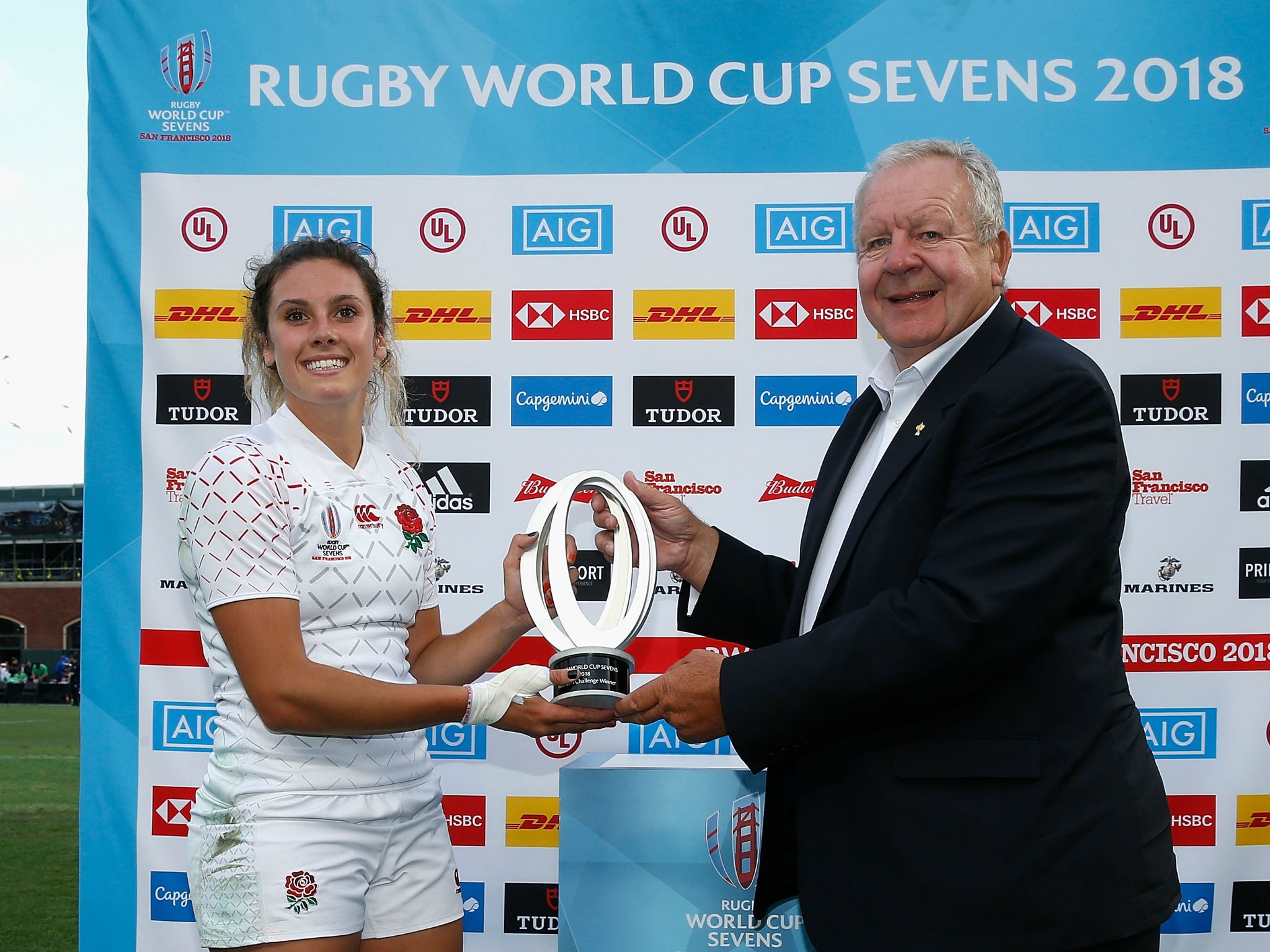England believe Women's Sevens future is bright despite Rugby World Cup disappointment as RFU face difficult decision
England conceded just one try in three matches, but the opening defeat by Ireland raises serious questions about the RFU's future approach to the women's game
Having put their disappointing start at the Rugby World Cup Sevens behind them, England Women’s emphatic response is reason to believe that the team are moving in the right direction following the Rugby Football Union’s gamble to sacrifice the 15s game in order to focus on the shorter format.
An early defeat by Ireland ended any chance of England finishing higher than ninth in San Francisco, but three consecutive victories against Mexico, China and Japan ensured that the side finished with a flourish and lifted the Challenge Trophy as a result. While beating those three teams may not be a surprise given the calibre of this England team and the resources that the RFU are able to throw at the game, the manner of their wins – conceding a staggering one try in three matches – suggested that this side should have been fighting much higher up the competition.
Such was the impact of the new format, England were left to rue their first-round defeat, but experienced international Natasha Hunt believes that the way they bounced back is reason to be optimistic for the future of the game, even if the next shot at a World Cup is four years away.
“That massively showed our resolve,” Hunt said. “It shows the strength of character of the group. We were bitterly disappointed that we didn’t put our best foot forward in the first game but we came out and fought for each other, the other girls back home and our support staff. One try in three games, I didn’t even know that stat, that is brilliant.
“It is sport at the end of the day and somebody always has to lose. That is the nature of sevens, you never know when you take to the field. All credit to the teams that are consistently performing at the moment, we are not quite there yet but this just goes to show that this is another step in the right direction. Every time we come out we get better, we are enjoying it and you can’t fake the smiles when we were running in the tries there. We were so disappointed about the Ireland game because we know we have so much more to give. We just want to get better.”
The problem is that while England Men are able to pick from a selection of specialist sevens players, the women are not yet there when it comes to numbers involved in the game. As a result, the RFU elected not to renew a number of contracts with those who featured in the Women’s Rugby World Cup last summer and instead offer a select few of them deals to play sevens, such as Hunt, Deborah Fleming and Emily Scarratt.
It is for that reason that the performance at AT&T Park will be deemed not good enough when the RFU review the World Cup, and even though they won three of their four matches, it is not a good look for the richest union in the game.
In previous editions, England would have been given another chance due to the pool format that is normally deployed in the World Sevens Series, but the new knockout format trialled by World Rugby in San Francisco claimed its biggest victim in the red rose.
“It is cut throat as we have seen,” Fleming said. “It has caused some absolute upsets throughout the tournament and the girls have absolutely loved it. The format has worked well, it has just thrown more spanners in the works. That is sevens for you, sevens can go either way, you can get an eighth seed against a ninth seed and the ninth seed comes out on top. That is how the game is and that is why it is so thrilling and so consuming for everyone.”

Hunt seemed less convinced though, and admitted that the introduction of the same system to the Series – as is being considered by World Rugby – could be difficult to adapt to.
“It is a tough one because we love playing, so we want to play as much as we can play, which we get with the pool games,” Hunt added. “Equally, this tournament has been really exciting. You just have to look at the men’s tournament too, Scotland went from 26-0 to come through the round of 16, that shows the kind of game. If we had scored one extra try against Ireland, we wouldn’t be having these conversations now.”
Having placed a number of World Cup winners and finalists into the sevens programme, the RFU now face a decision on what to do with their contracts – either renew them or revert back to focusing on 15s. Having lost to France and seeing the Six Nations title go begging earlier this year, it is clear that the playing resources in England are not yet at the same level of the Black Ferns, who successfully defended their Sevens title at the weekend to add to last year’s 15s triumph.
But the optimism of a bright future for English sevens was evident at the full-time whistle on Saturday afternoon when captain Abbie Brown lifted the Challenge trophy, and with another two years before the next major tournament when they will combine with Wales and Scotland to form Team GB’s entry at Tokyo 2020, the RFU must now decide what path they are going to prioritise.
Swiss watchmaker TUDOR is the Official Time Keeper of Rugby World Cup Sevens 2018 in partnership with World Rugby. For further information visit www.tudorwatch.com
Join our commenting forum
Join thought-provoking conversations, follow other Independent readers and see their replies
Comments
Bookmark popover
Removed from bookmarks